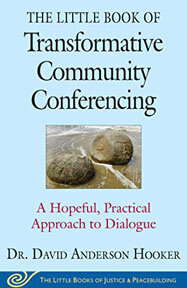
Transformative Community Conferencing
at Columbia Theological Seminary
At the Fall 2019 Meeting of the Board of Columbia Theological Seminary directed the seminary to begin a process of “institutional reckoning.”
Jane Fahey, Board Chair, reflected, “Like the wider society, Columbia has a unique opportunity to reckon with a sinful history that continues to haunt the present. The TCC process offers a constructive path of community-wide dialogue that will allow us to shape our collective life toward a more faithful future that promotes the liberation and flourishing of all at Columbia. The Board is excited about this hopeful venture, and we welcome all of Columbia's constituencies to join us.“
Dr. Leanne Van Dyk commented, “This TCC process is one step in Columbia's ongoing commitment to repairing the breach caused by white supremacy. Acknowledging the sins of our past, how do we then move forward to bear witness throughout our institutional life to God's desire for the flourishing of all people, but especially of Black persons who have borne the brunt of that past? This is a hopeful process of dialogue that will allow us to imagine and enact transformational possibilities.”
See the full Columbia press release here.
Under the leadership of Dr. Marcia Riggs, J. Erskine Love Professor of Christian Ethics and Dr. David Hooker, Associate Professor of the Practice of Conflict Transformation and Peacebuilding at the University of Notre Dame, Columbia has embarked on this journey.
Dr. Riggs shared, “I think that this is a Kairos moment when all of Columbia’s past and present constituencies are being called to do the difficult work of dismantling white supremacy here and now in this place.”
“I’m jazzed about helping people identify new stories and new narratives where they can flourish,” said Dr. Hooker. “I think Columbia Seminary possesses an important and unique opportunity to contribute to the larger conversation in higher education, addressing harms done and determining reparations for those communities.”
What is Transformative Community Conferencing?
In his book, The Little Book of Transformative Community Conferencing, Dr. Hooker describes the process as an invitation for community members to uncover narrative frames that that continually “reinforce and reproduce” an environment of injustice and harm. [1]
The goal of the process is to “identify or develop preferred narratives” of how we will interact and live in relationship with each other in the future. [2]
What is a narrative frame?
The narrative frame is more than just the telling of the events that occur. It includes the “setting or context, the characters, and the specificity of the conflict” that surround the events that have occurred over time. [3] Each of us inhabit our stories with what we believe are “appropriate behaviors, emotions and expectations.” [4]
What did TCC mean for Columbia?
This process is designed to “plant the seeds and establish the trellis” for the community to develop and allow a new narrative frame to grow and flourish. [5] An opportunity is created “for deep sharing and trust building,” to move “beyond dialogue,” and create the basis for the community to collaborate and coordinate their actions. [6]
Footnotes:
[1] Dr. David Anderson Hooker, The Little Book of Transformative Community Conferencing: A Hopeful, Practical Approach to Dialogue (New York, New York: Good Books, 2016). 6.
[2] Hooker, 28.
[3] Ibid., 14.
[4] Ibid., 5.
[5] Ibid., 26.
[6] Ibid., 38.

